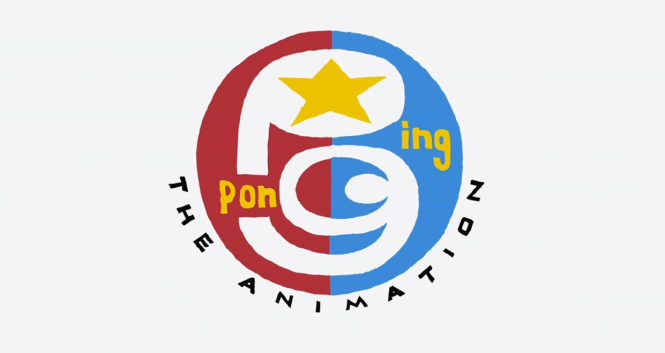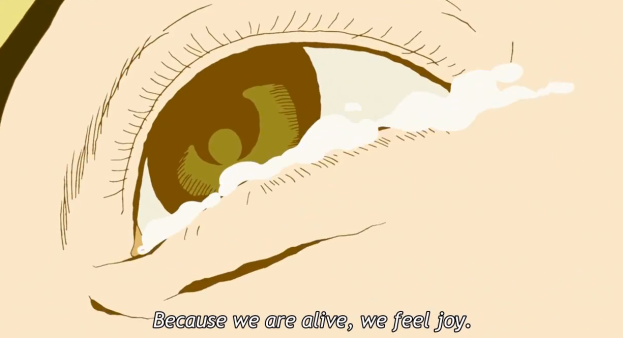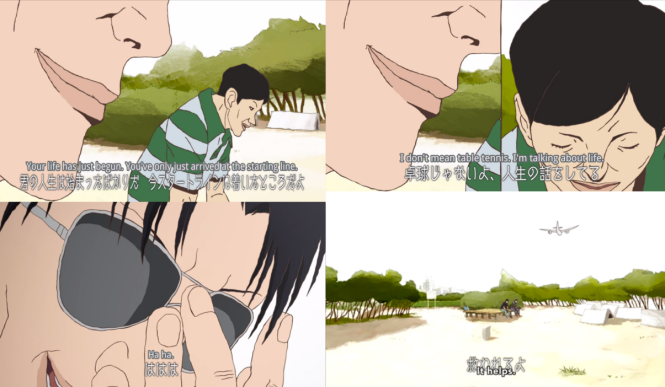There are some shows that I consider “moments” shows. They’re shows you watch for the few seconds or few shots of brilliant beauty interspersed between a lot of reasonably good, but not great material. Ping Pong the Animation [Tatsunoko Productions, 2014] is what happens when you take a “moments” show and bring all the in between moments up to the level of the moments. It’s an unreservedly ambitious, glowingly creative and masterfully executed show worthy of the rating I’m about to give it. For all of the above, and everything I haven’t said yet, I’m giving Ping Pong the Animation a 9/10. (Ranking)
It says a great deal (and it’s certainly no coincidence) that Ping Pong is only the second show I’ve watched weekly to get a rating above an 8 (the first was Silver Spoon). As an anime watcher, I am enormously reliant on the holistic experience of marathoning a show for producing emotional engagement and sustained affection. But Ping Pong, through sheer artistic prowess, has somehow cut straight through my penchant for forgetting my feeling about a show over the long weeks in between episodes.
And, artistically, it’s tough to really make any sort of judgement on Ping Pong. It’s kind of ugly looking (as I’m told is typical of director Masaaki Yuasa’s works), but balances the twisted faces and convoluted postures with with direction and storytelling that dances like it’s a ballet. Ping Pong is, essentially, the result of a production in which every little piece is perfectly synchronized towards a single goal: direction, artwork, animation, writing, characters—they all point to the same thing.
This is a show about being alive.
There are a lot of different ways to live. You can live in fear. You can live in selfishness. You can live in hate, worry or anger. But, you can also live for love and happiness and for simply being alive. Life is the greatest gift we humans have. And you can live for a lot of different things. You can live for yourself, for others, for money, for ping pong or for life. Life is the one thing that you can live for, no matter how reflexive it is, no matter what. Because everything we experience on this earth is first predicted on being alive.
Not everyone in Ping Pong understood this at the start of the show. In fact, among Smile, Peco, Akuma, Kazama and Kong—none of them did. Smile lived in a state of perpetual mundanity and mediocrity. Peco lived in his own castle of fantasies, one that blinded him. Akuma lived in the anguish of never being good enough. Kazama lived in fear of failure. Kong lived in agony of loss. Each of these young men came to the ping pong table without being able to see beyond their own constructed world. And living in your own world is inherently a limiting experience. By doing so, each trapped himself within a cage of his own making and threw away the key.
The beautiful thing about Ping Pong is how those cages crash together, break each other down and fade away as men who understand what it means to be alive arise from the debris.
Ironically (or perhaps logically) it is the boy who first seems farthest away from this understanding who comes to it first: Kong Wenge (resident cool glasses guy). Because Kong has the most riding on the sport of table tennis (a return home—a return to his mother), he is the first to see his cage destroyed, as Kazama defeats him and banishes him to a life of exile on a distant island. Amidst the wreckage of his career and his life, Kong is forced to confront the realities of staking his entire life and self-worth on his accomplishments at the ping pong table. It’s the classic saying: put all your eggs in one basket and if you drop the basket, you lose everything. But as Kong struggles to figure out who he is without ping pong, he finds solace in the words of his coach, his mother, and in the very teammates he once spurned.
In the magnificent Christmas episode, an episode that highlights the differences in the respective journeys of the characters of Ping Pong, we see Kong as the only one truly able to enjoy the holidays, to enjoy life. Indeed, having lost his previous way of life, Kong is forced to embrace the world outside himself and, in doing so, finds a joy he’s been lacking for a long time.
Kong’s arc is more or less a foreshadowing of the arcs each of the other players—Smile, Peco, Kazama and Akuma—go through. Each of them finds their previous way of life attacked by the others, and each of them is forced to confront the world in an entirely new way. And in opening themselves up to the world beyond their own fragilely constructed cages, they find that the world is a whole lot more beautiful than they imagined.
Whether they be dragon, hero or robot, each player finds their way in life. Ping Pong wields these symbolic roles in a manner that both simplifies and ornaments the story and theme. By placing each character into a sort of archetype, the show compresses the complex motivations, feelings and actions of each character into an easily accessible package, miraculously without sacrificing the essence of the character. Symbolism always runs the risk of esotericism, but Ping Pong integrates the symbols into the story as if they were necessary to its very existence—and they are. The symbols function as the skeleton of the story, molding the separate character arcs into a fascinatingly simple whole. Ping Pong is not five stories of five characters. It’s one story.
If you can’t live life for life’s own sake, you won’t be able to find happiness. You must first accept being alive before you can accept anything else. You must accept everything about being human and about being yourself—and then live your life according to those truths. It doesn’t so much matter if you see yourself as a hero as it matters if you can find joy in living like that. It doesn’t so much matter if you center your life on one passion as it matters if you can truly live as yourself like that.
Ping Pong reminds us that we’re alive. In all our many ways, along our many paths, we’re alive. And if we can help others to understand this as we live ourselves, the world will be a better place for it.
RECOMMENDATION:
I unreservedly recommend Ping Pong the Animation to anyone at all. These are universal messages, ones that everyone should hear. As an artistic experience, it’s phenomenal. And for the last time, this show is NOT ACTUALLY ABOUT PING PONG, so don’t ignore it because it’s a sports anime.
Reasons to Watch:
- Outrageously energetic OP song; awesome ED song.
- Superb directing and storytelling.
- Masterful use of symbolism that enhances the story without making it esoteric.
- Multi-faceted and sympathetic characters that grow and change the entire show.







I’m just glad to see you say that it isn’t about the sport. So many people call out that Ping Pong TA is the first sport show they liked and that they wished more sport shows were like Ping Pong TA. This isn’t about the sport son, the sport is a facet. A canvas for the creator to paint on in a unique style, creating something you’d hang up in the Louvre.
LikeLike
Even worse, there were a lot of people let down by the show because they tried to understand it by the standards of traditional sports shows. As I said all season long: “Ping Pong is not about ping pong.”
LikeLike
I think the really good anime series are helped when watched weekly because the viewer has time to reflect, pull apart and digest each episode before the next one airs. And conversely, I think the rest suffer because they lack the substance to stand-up to the increased scrutiny of weekly watching.
Ping Pong was a little more “ugly” in the animation department then past Masaaki Yuasa series due to being given too little time to animate it. His earlier series – Kaiba and Tatami Galaxy – were better quality examples of his style of animation. And they are both series I highly recommend since you liked Ping Pong so much and the reasons you give to watch Ping Pong could be copied verbatim as the reasons to watch Kaiba and Tatami Galaxy.
LikeLike
I’m not sure how I did that but I did not mean to make the font so big, sorry.
LikeLike
No problem! I’ll change it. 😀
LikeLike
“And conversely, I think the rest suffer because they lack the substance to stand-up to the increased scrutiny of weekly watching.”
This is actually probably a valid point, but for someone like me who likes consuming things in chunks, I like being able to gloss over the little flaws. If you happened to read my response to Golden Time, I talk in there about how marathoning it was integral to my enjoyment and opinion of it. Very few shows are going to be a technically strong as Ping Pong, but they can still be just as valuable thematically. I don’t want to miss the forest for the trees, you know—and if marathoning things will help me avoid that, that’s what I’ll keep doing.
LikeLike
Reblogged this on cornJi.
LikeLike
[…] [Ping Pong has] universal messages, ones that everyone should hear. As an artistic experience, it’s phenomenal. And for the last time, this show is NOT ACTUALLY ABOUT PING PONG, so don’t ignore it because it’s a sports anime. [Mage in a Barrel] […]
LikeLike